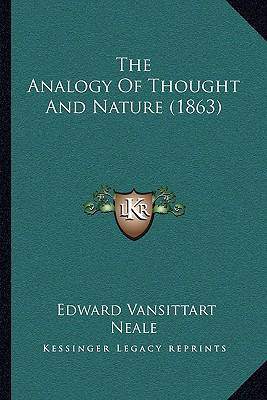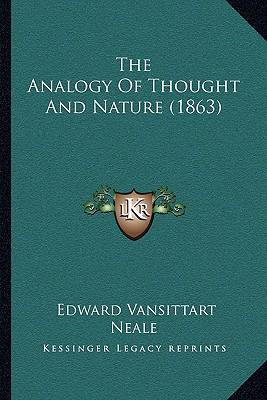
- Retrait gratuit dans votre magasin Club
- 7.000.000 titres dans notre catalogue
- Payer en toute sécurité
- Toujours un magasin près de chez vous
- Retrait gratuit dans votre magasin Club
- 7.000.0000 titres dans notre catalogue
- Payer en toute sécurité
- Toujours un magasin près de chez vous
40,95 €
+ 81 points
Format
Description
The Analogy of Thought and Nature, written by Edward Vansittart Neale and published in 1863, is a philosophical work that explores the relationship between human thought and the natural world. Neale argues that there is a fundamental connection between the two, and that human beings can gain a deeper understanding of nature by studying the workings of their own minds.The book is divided into three parts. In the first part, Neale introduces his thesis and lays out his argument for the analogy between thought and nature. He draws on the work of philosophers such as Immanuel Kant and Johann Wolfgang von Goethe to support his claims.In the second part, Neale delves deeper into the analogy, exploring various aspects of human thought and relating them to different phenomena in nature. He discusses the role of imagination, the nature of perception, and the workings of the human mind in general.In the third part, Neale applies his ideas to a range of topics, including art, science, and religion. He argues that a better understanding of the relationship between thought and nature can lead to a more profound appreciation of these subjects.Overall, The Analogy of Thought and Nature offers a unique perspective on the relationship between human beings and the natural world, and provides a thought-provoking exploration of the connections between the two.This scarce antiquarian book is a facsimile reprint of the old original and may contain some imperfections such as library marks and notations. Because we believe this work is culturally important, we have made it available as part of our commitment for protecting, preserving, and promoting the world's literature in affordable, high quality, modern editions, that are true to their original work.
Spécifications
Parties prenantes
- Auteur(s) :
- Editeur:
Contenu
- Nombre de pages :
- 270
- Langue:
- Anglais
Caractéristiques
- EAN:
- 9781165787661
- Date de parution :
- 10-09-10
- Format:
- Livre broché
- Format numérique:
- Trade paperback (VS)
- Dimensions :
- 152 mm x 229 mm
- Poids :
- 362 g

Les avis
Nous publions uniquement les avis qui respectent les conditions requises. Consultez nos conditions pour les avis.






